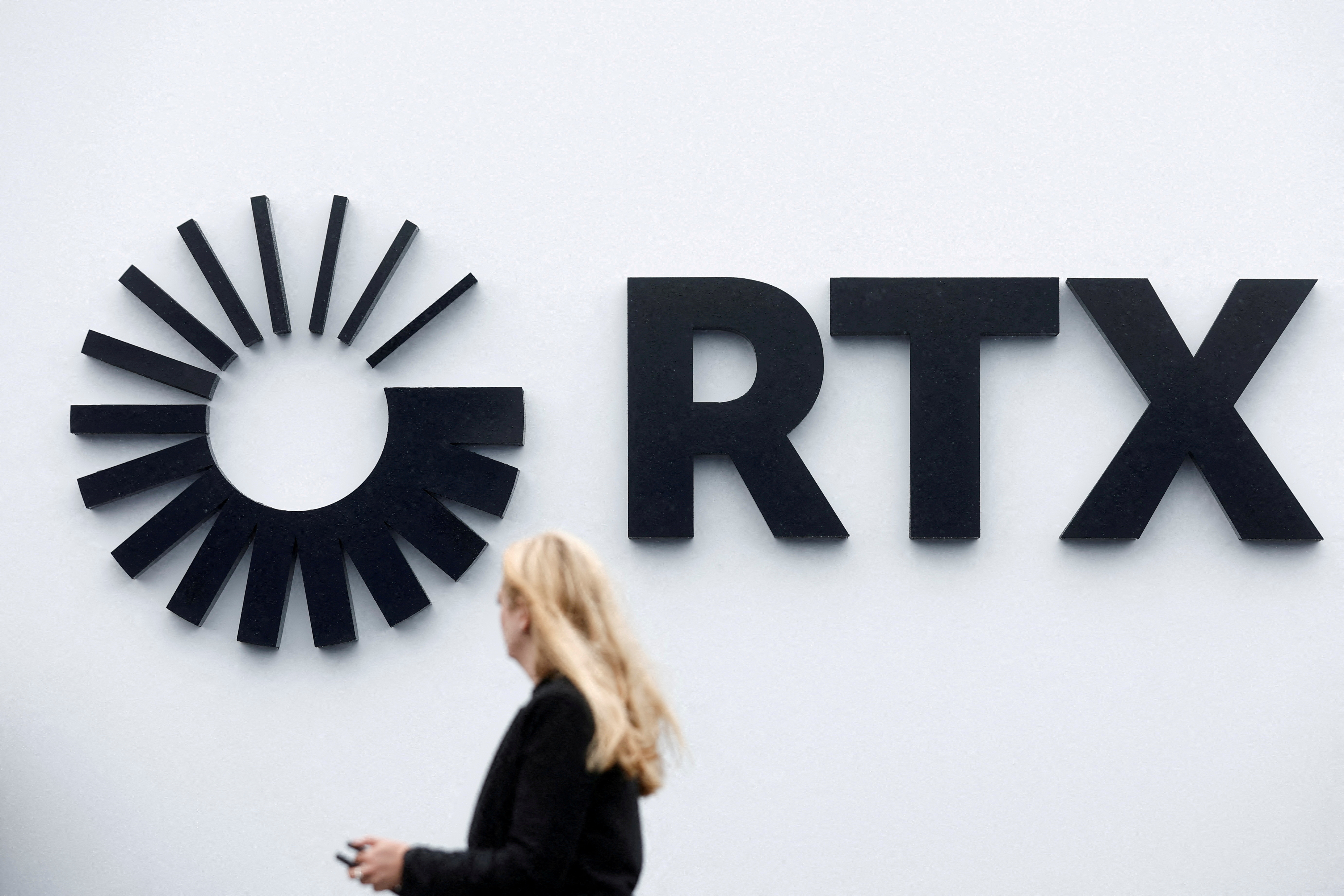
Visitor passes the Raytheon Technologies Corporation (RTX) logo at the 54th International Paris Air Show at Le Bourget Airport near Paris, France, June 22, 2023. REUTERS/Benoit Tessier/File Photo Acquire Licensing Rights
Sept 12 (Reuters) – Aerospace suppliers and airlines around the world warned of rising costs and a squeeze on plane capacity after U.S. engine maker RTX (RTX.N) disclosed that a rare manufacturing flaw could ground hundreds of Airbus (AIR.PA) jets in coming years.
The problem, a rare powder metal defect that can lead to cracks in some engine components, is the latest trouble for the industry, which has been grappling with shortages of staff and supply-chain woes even as travel rebounded from pandemic lows.
RTX said on Monday it would have to pull 600 to 700 of its Pratt & Whitney Geared Turbofan (GTF) engines from Airbus A320neo jets for quality inspections over the next three years.
The beleaguered supplier’s shares closed down 1.7% after earlier hitting a more than two-year low of $73.66 on Tuesday, but it drew backing from Airbus CEO Guillaume Faury who said at an event in Washington D.C. that the repairs were necessary to ensure safety.
“We don’t like the situation, but we think that was the right thing to do,” he said, adding that the problems are “very unfortunate.”
Airbus said on Monday it does not expect an effect on its 2023 deliveries. Its shares fell 2.4% in Paris on Tuesday.
The engine issue was first disclosed in July, but RTX made the extent of the problem clearer on Monday.
The announcement caused waves up and down the industry, from component manufacturers like Japan’s Kawasaki Heavy Industries to airline carriers like Germany’s Lufthansa that rely on the popular Airbus jets.
The problem may worsen a tug-of-war over engines between airplane factories and repair shops, industry sources told Reuters, as repairs take longer to fix.
The snag could ground an average of 350 jets a year through 2026, with as many as 650 jets sitting idle in the first half of 2024. RTX initially estimated repair work per engine to last 60 days, but it is now expected to take up to 300 days.
In July, RTX said microscopic contaminants were found in a powdered metal used in high-pressure turbine discs that are part of the GTF engine’s core. The presence of those contaminants could lead to cracks in the engine.
Replacing the discs requires removing the engine, disassembling and reassembling it. The engines affected were made between 2015 and 2021.
Shares of RTX, which was formed from the merger of Raytheon and United Technologies in 2020, have lost a quarter of their value since disclosing the problem in July.
“When the company initially identified the powder metal issue with the GTF engine, we had confidence that the issue, based on the data provided, was relatively well contained,” said RBC Capital Markets analyst Ken Herbert in a note.
“The financial and operational impact identified is more substantial than we had expected.”
AIRLINES, MANUFACTURERS DETAIL HIT
Aerospace suppliers with a stake in the troubled engine program said the issue would affect their costs. London-listed aerospace component maker Melrose Industries (MRON.L) said it faces a potential hit of around 200 million pounds ($249.2 million).
Japan’s IHI (7013.T) and Kawasaki Heavy Industries (7012.T) said they expect an earnings hit from the lengthy inspections, while German firm MTU Aero Engines (MTXGn.DE) warned of lower profits on Monday.
Lufthansa (LHAG.DE) said on Tuesday the snag will result in the German flag-carrier grounding 20 A320neos at any time.
When asked if he had a comment on the update from RTX, JetBlue Airways CEO Robin Hayes said: “No — we’re still waiting for ours.”
Air New Zealand (AIR.NZ), which has 16 A320neo jets in its fleet, said on Tuesday the issue will further reduce engine availability and would have a “significant” impact on its flight schedule from January 2024.
Scoot, a unit of Singapore Airlines (SIAL.SI), said the inspections would affect four of the engines that power its A320neo fleet and could force it to adjust some of its flights.
On Monday, Hungarian carrier Wizz Air (WIZZ.L) estimated a potential 10% capacity hit in the second half of fiscal 2024.
RTX is one of two manufacturers of engines for the popular narrowbody Airbus A320neo, the other being CFM International, a joint venture between GE (GE.N) and Safran (SAF.PA).
($1 = 0.8026 pounds)
Reporting by Valerie Insinna and David Shepardson in Washington, Rajesh Kumar Singh in New Delhi, Abhijith Ganapavaram, Aniruddha Ghosh, Mehr Bedi in Bengaluru; Editing by David Gaffen and Arun Koyyur
: .

